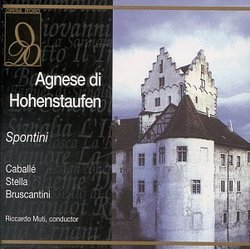| All Artists: Gaspare Spontini, Riccardo Muti, Montserrat Caballé, Antonietta Stella, Sesto Bruscantini, Walter Alberti, Giampaolo Corradi, Giangiacomo Guelfi, Ferruccio Mazzoli, Bruno Prevedi, Giovanni Antonini Title: Spontini - Agnese di Hohenstaufen / Caballé · Stella · Bruscantini · Muti Members Wishing: 0 Total Copies: 0 Label: Opera D'oro Release Date: 3/23/1999 Genre: Classical Style: Opera & Classical Vocal Number of Discs: 2 SwapaCD Credits: 2 UPC: 723723434029 |
Search - Gaspare Spontini, Riccardo Muti, Montserrat Caballé :: Spontini - Agnese di Hohenstaufen / Caballé · Stella · Bruscantini · Muti
 | Gaspare Spontini, Riccardo Muti, Montserrat Caballé Spontini - Agnese di Hohenstaufen / Caballé · Stella · Bruscantini · Muti Genre: Classical
|
Larger Image |
CD Details |
CD ReviewsAn excellent piece from the unfamiliar repertory J. E. ASENCIO-NEGRON | Guaynabo, Puerto Rico USA | 04/29/2000 (5 out of 5 stars) "Montserrat Caballé (soprano) embarked herself over the last 3 decades upon an astonishing exploration of unfamiliar repertory. This includes Spontini's La Vestale & Agnese di Hohenstaufen, Gluck's Armide, Salieri's Les Danaïdes, Donizetti's Sancia di Castiglia, Pacini's Saffo, Cherubini's Medea & Démophon, Rossini's Ermione & Il Viaggio a Reims, Respighi's La Fiamma, and Massenet's Hérodiade.As you have seen from the aforementioned list, she has a remarkable enthusiasm for tackling forgotten works. In this, she has has in fact gone considerably further than Maria Callas and Joan Sutherland, who were also interested in discovering forgotten operas from classical & romantic repertoire. This recording captures Ms. Caballé in the extraordinary demanding role of Agnese (which she performs superbly), in Spontini's last opera: Agnese di Hohenstaufen (premiered as "Agnes von Hohenstaufen", 1827, Berlin). Her vocal prowess and pleasing bel canto is evident is the 2nd act aria (CD2 Track 2): "O Re dei Cieli". Spontini's elaborate & rich orchestration, as well as his imaginative harmonization in ensembles with chorus are quite evident since the beginning of the opéra (CD1, Track 1). If you are a fan of Caballé, and appreciate an excellent soprano performance, I assure you would not like to miss this performance of the 1970's revival of : "Agnese di Hohenstaufen" under Riccardo Muti (director)." Grand opera at its grandest B. Cathey | Wendell, NC United States | 01/08/2002 (4 out of 5 stars) "AGNESE di HOHENSTAUFEN truly epitomizes the 'grand' in grand opera. This performance features the unexcelled vocalism of Montserrat Caballe, with excellent support from the underappreciated Bruno Prevedi and Giangiacomo Guelfi. Spontini's considerable talent (and reasons for criticism!) are all on display--the vocal lines seem never to end...arias become duets, which become quartets, only to become choruses and then arias again...there is a steady stream of gorgeous music (that certainly caught Wagner's attention). The Opera d'Oro issue is presently the only current one available of this justly memorable performance; an earlier issue by Rodolphe Productions had clearer and more detailed sound, but is sadly out of print. Still the price is right...so recommended, at least until Myto or some other enterprising label reissues it. Note: there is a video of this production, although not the same performance (and with a different conductor), that can be found in specialty shops." An Interesting Opera Halvor | United States | 09/03/2000 (4 out of 5 stars) "This opera was revived in 1925 for the great Rosa Ponselle, and in the nineteen fifties for the equally great Anita Cerquetti. (You should hear Cerquetti sing the opera's big aria, "O Re die Cieli!" It is sensational!) The recording currently under discussion was made in Rome in 1970. Montserrat Caballe is the star of this show, singing with power and passion in the title role. In the quieter passages, she is simply ravishing. Antonietta Stella, a La Scala favorite, sings a firm and controlled Irmengarda, and our two tenors, Bruno Prevedi and Giangiacomo Guelfi, are powerful singers. They are required to sing over the huge orchestra for long periods of time; both do it well and don't sound as if they are tiring. Their lyrical passages involving smaller instrumental forces are also very well executed. Sesto Bruscantini, that versatile basso, is excellent in his role as the Duke of Burgundy. (I have heard Bruscantini sing a wonderful Don Pasquale and a Vivaldi opera many years ago. What a diversity of roles!) The secondaries for the most part sing well. Riccardo Muti conducts the capable RAI Symphony Orchestra and Chorus of Rome with poise and balance, never burying the singers. The recording itself sounds old fashioned and is subject to tape saturation in loud places, but it still listenable. There is a booklet with some history of the opera in it, but no libretto. If you like your opera on a large scale, then this is for you."
|

 Track Listings (9) - Disc #1
Track Listings (9) - Disc #1